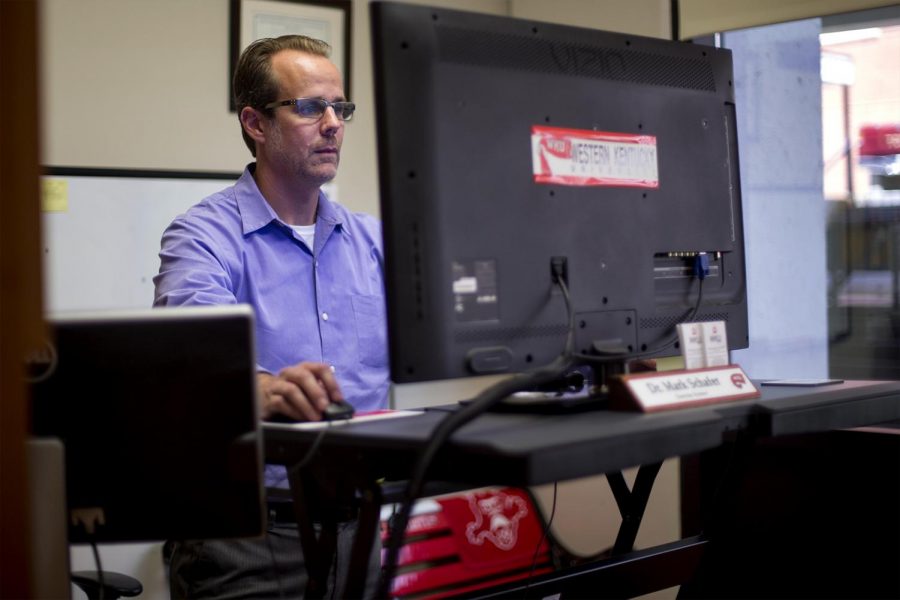Sit-stand desktop workstations find their place at WKU
August 31, 2016
A new study at WKU is requiring participating staff members to stand throughout their day in an attempt to reduce sedentary time among workers.
Mark Schafer, associate professor and undergraduate program coordinator in exercise science and graduates in kinesiology, will be heading a study on sit-stand desks in the WKU workplace.
Previous studies have shown that sitting throughout the workday can have a negative impact on the body, especially if workers sit for long periods of time. David Oliver, director of environmental health and safety, said sit-stand desks have the opportunity to help many who have back, neck or circulatory issues.
“The units allow for adjustability of work postures while seated or while standing,” Oliver said. “We are very interested in getting the feedback from the study to see the impact they have across a variety of employees and work situations.”
A total of 60 desks were donated by Ergotron, a company specializing in adjustable furniture. WKU will be using Ergotron’s WorkFit-S Dual Monitor Sit-Stand Desk with Work Surface model for their study.
In an initial study by faculty of WKU’s School of Kinesiology, Recreation and Sport, subjects had the choice of either the sit-stand desk or a treadmill desk, which allows users to walk while providing a flat workspace to work on.
For this initial study, subjects were allowed to stand or walk on the treadmill desk of their own free will.
“We wanted to see if they had access to them, how often would they be used,” Jason Crandall, assistant professor of exercise science, said. “That was really the purpose of that study, which kind of leads us to the next study that we are doing now.”
To properly allocate the 60 desks throughout campus, Schafer released a flyer requesting staff who spend the majority of their day sitting at their desks. Participants must be willing to stand for a portion of the day during the study.
“One of the interesting things so far is the very quick and robust response that we received,” Schafer said. “I have never been on a study that has had that many people interested in a study that we are doing right here in this lab.”
To participate in the study, staff members are divided into three different groups, each of which require different degrees of sitting and standing. Group A has the most aggressive sitting and standing requirements, in which they stand for longer periods of time than the other two groups.
Group B has a less aggressive sitting and standing schedule; these participants stand less than group A but more than group C. Group C is considered the control group. Members are allowed to sit and stand of their own free will, though they have to measure how long they do sit and stand each day for the study.
For group A and group B, notifications will be sent on when subjects need to stand or when they need to sit. These notifications will be sent out at a specific time, which say how long a subject needs to stand within that time period.
The sit-stand study, Evaluation of Sit-Stand Desktop Workstations in the Workplace, will begin Sept. 12. The study will last 10 weeks and will end during Thanksgiving week. As incentive for joining the study, six sit-stand desks will be raffled off to the subjects once the study is complete.
“We hope to use the desks in another study with faculty and staff or in the classroom,” Schafer said. “There are a lot of things we can do with them to move forward.”
The funding for the initial study came from WKU Health Services, WKU human resource department, School of Kinesiology, Recreation, and Sport, the department of environmental health and safety, Workers’ Compensation Program, Employee Wellness Program, and the Division of Finance and Administration.
The study was created to show changing patterns and behaviors in the workplace as well as reducing sedentary time. According to both Schafer and Crandall, the ultimate goal of these studies is to help the staff by providing information that could help improve workplaces as a whole.
Reporter Elisabeth Moore can be reached at 270-745-6288 and elisabeth.moore938@topper.wku.edu. Follow her on Twitter at @emoore938.














